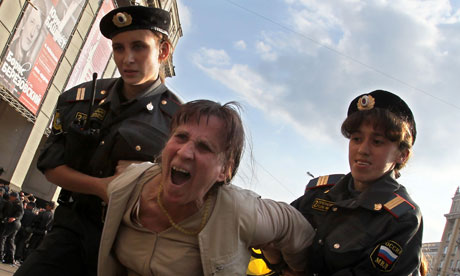Russia to introduce 'draconian' Minority Report-style law: Going back to the days of the KGB 'Police' - Legislation will give security services powers to arrest people for crimes they have yet to comm
Russia to introduce 'draconian' Minority Report-style law
Legislation will give security services powers to arrest people for crimes they have yet to commithttp://www.guardian.co.uk/world/2010/jul/29/russia-minority-report-...

Russian citizens can be issued official warnings about crimes that they have not yet committed under powers granted to the security services today.
President Dmitry Medvedev signed off on a new law giving the FSB, the successor agency to the
KGB, the right to caution people suspected of preparing acts of
extremism, or to jail them for obstructing the agency's work.
The powers appear similar to those enjoyed by Precrime, the police unit in
the 2002 Hollywood film Minority Report. "This is a draconian law
reminiscent of our repressive past," said Boris Nemtsov, a leader of the
Solidarity opposition movement.
Rights activists had hoped Medvedev would rein in the security services, after his predecessor, Vladimir Putin, a former KGB colonel, stuffed his administration with hawkish veterans.
The Kremlin's tough stance comes against the backdrop of a disparate
but emergent civil movement protesting against corruption and
authoritarian government.
Under the new provisions, the FSB will be able to echo Soviet practices. The punishment for ignoring a warning
was unclear, but 15-day jail sentences are envisaged for "obstructing an
FSB officer's duties". Sergei Ivanenko, a leader of the Yabloko party,
called it "the law of a police state". He said: "If such a law exists in
a democratic country then it is limited by a very powerful system of
civil, public and parliamentary control. In our conditions it will mean
absolute power for the security services."
Rights activists, who fear the measures could be used to stifle civil disobedience, had expressed optimism that Medvedev might step in to quash the legislation.
There have been signs of democratisation under Medvedev, while Putin, whom he
replaced two years ago, has continued to promote a hardline image from
his post as prime minister. But during a meeting with Germany's
chancellor, Angela Merkel, a fortnight ago, Medvedev said: "Each country
has the right to perfect its own legislation, including that which
affects its special services." He added: "What's going on now – I would
like you to know this – was done according to my own direct
instructions."
Russia's police and security services have looked increasingly clumsy as they
try to deal with inventive grassroots activists or single-issue protest
groups. One group wears blue buckets on their heads in mimicry of the
flashing blue lights on the cars of bureaucrats who terrorise the roads:
police arrested several activists but had to let them go because they
had committed no crime. Another organisation has been attacked while
trying to stop destruction of a protected forest near Moscow.
"Medvedev may smile more than Putin but the face of power hasn't changed," said
Eduard Limonov, an opposition politician who plans to run for president
in 2012. "The Kremlin is still terrified there will be an Orange
Revolution in Russia if people are allowed to gather on the streets."
This Saturday will be the first anniversary of protests started by Limonov
and a coalition of activists known as Strategy 31. They meet in
Triumfalnaya Square in Moscow at 6pm every 31st of the month to
demonstrate in favour of Article 31 of the constitution: the right to
free assembly.
Despite each rally being broken up by riot police, the protests have grown steadily, attracting more than 500 people in May. About 180 of them were arrested.
"Instead of thinking of new ways to suppress us, the authorities should listen to our concerns," said Limonov.
Yet democracy activists are often demonised as traitors or extremists in
the state-dominated media. This week at its summer camp the
Kremlin-backed Nashi youth movement put up a photograph of 83-year-old
Lyudmila Alekseyeva, one of the organisers of Strategy 31, on a dummy
wearing Nazi insignia.
On Saturday she will go to Triumfalnaya. The protest movement, she said, "will only grow in the face of repression."
Tags:
Replies to This Discussion
"Destroying the New World Order"
THANK YOU FOR SUPPORTING THE SITE!
Latest Activity
- Top News
- ·
- Everything
Catherine Fitts: Epstein, CIA Black Budget, the Control Grid, and the Banks’ Role in War
Ключові слова в тексті: як органічно їх вписати в статтю
Orwell - Football, Beer & Gambling
I, Pet Goat VI by - Seymour Studios | I, Pet Goat 6
Official Trailer NOVA '78 directed by Aaron Brookner and Rodrigo Areias
Peter Sellers - The Party (opening scene)
© 2026 Created by truth.
Powered by
![]()